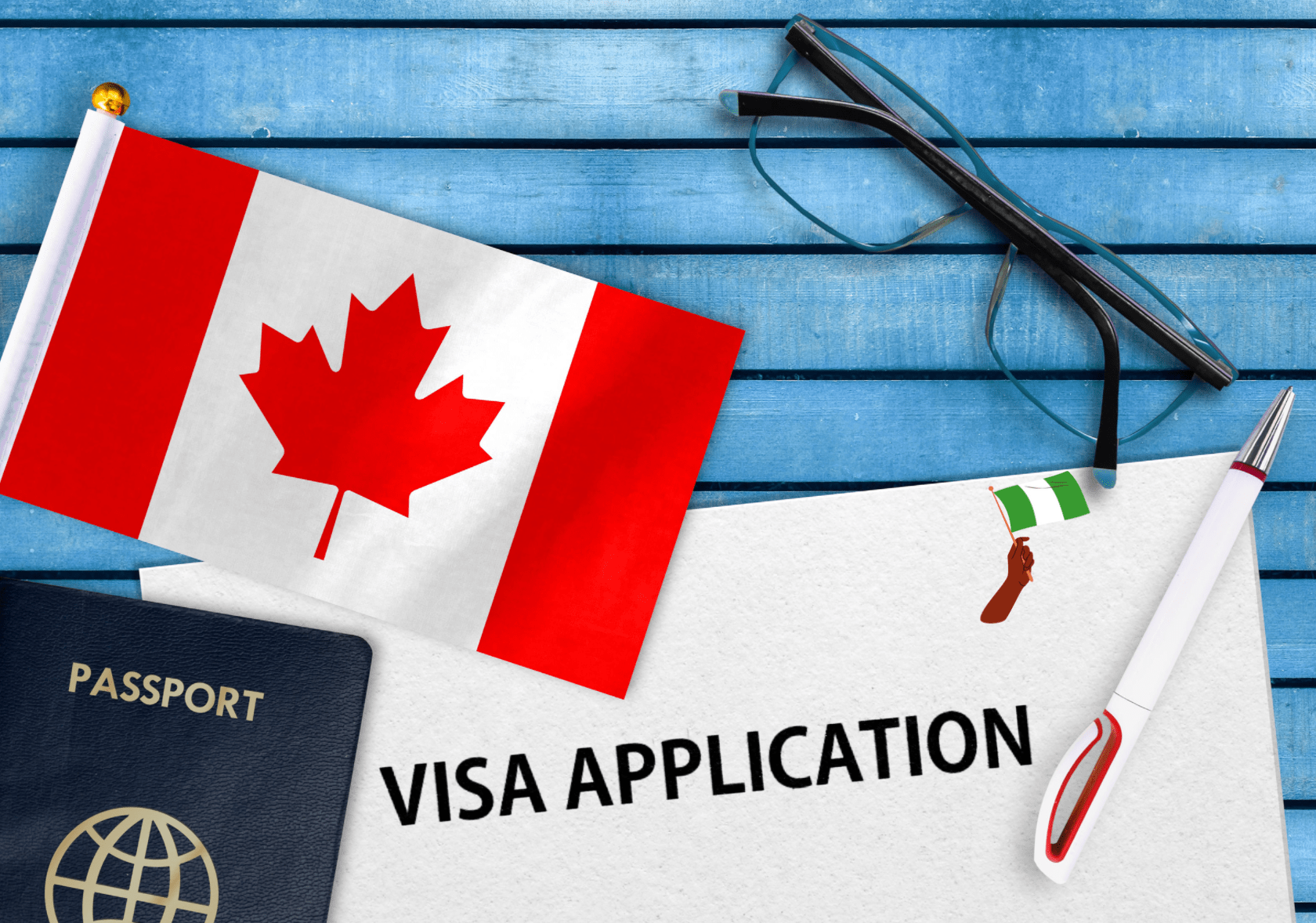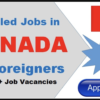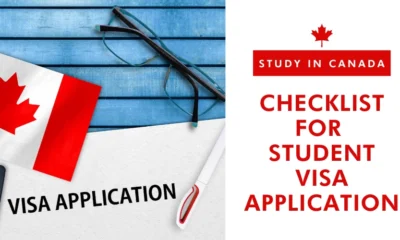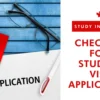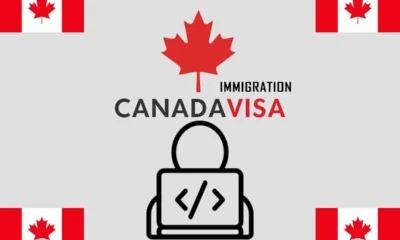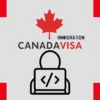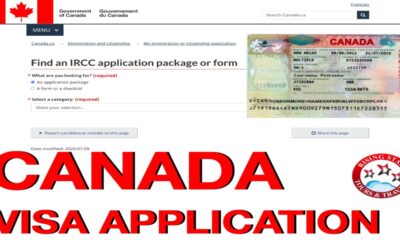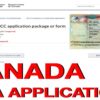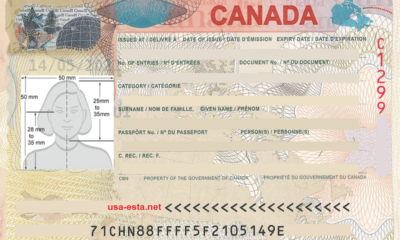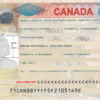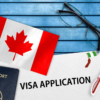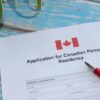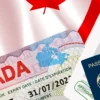Canada Immigration
How To Get A Canadian Student Visa Or A Canadian Study Permit
Besides being a very popular tourist destination, Canada is also attractive to students. It is a highly developed country with a great teaching methodology and valuable degrees. That is why, a lot of people want to enroll their children in Canadian primary or secondary schools, while adults also want to start their undergraduate or graduate programs there. To be able to do this, the students must have a study visa and study permit.
This article will go through the details of the student visa and study permits.
What is a Canada Student Visa?
A Canada Student Visa allows the person who has it to start their studies in Canada. The visa for students is basically the same as a Canada Visitor Visa or an Electronic Travel Authorization (eTa), but the student also needs a study permit. So the Canada student visa is a combination of either a visitor visa and a study permit or an eTA and a study permit.
The Canada study visa will only allow you to start your studies in Canada at what are called Designated Learning Institutions (DLI). The study permit allows you to stay in Canada until your program ends and in some cases work while you are enrolled in school or work after you graduate. To keep the Canada study visa, you must fulfill these conditions:
- Always be enrolled in a DLI.
- Be working to complete your study program.
- Meet the requirements of the student visa.
- Stop studying if you do not meet the requirements of the student visa.
- Leave Canada immediately once your study permit expires.
The study permit will not allow you to get Canadian issued documents or Canadian government benefits such as health benefits. It will however create an easier path for you to be able to apply for a Canadian citizenship if that is your goal.
What is a Designated Learning Institution?
As mentioned, you can only get a Canada student visa if you are enrolled in a Designated Learning Institution (DLI). DLIs are schools or universities which are approved by the provincial or territorial government to allow them to host international students.
All primary and secondary schools that are in Canada are by default DLIs; however, there are many universities or other educational institutions which are not certified DLIs. You must not apply in those, since you will not be allowed to attend them even if they accept you.
To check whether a university or educational institution is a DLI, follow this link. It will take you to the Government of Canada website which is the official institution for all Canadian visas. In the page, you must select the province or territory and it will generate a list of all institutions which are DLIs. You can check there whether the place you want to apply to is a DLI or not.
If while you are attending the institution, it loses its DLI status, then you can continue studying there until your study permit expires. If your permit expires before you complete your degree, then you must enroll in a new institution which is a DLI to be able to get a new study permit.
Who Needs a Canadian Study Permit?
All international students who want to study in Canada and who need a visitor visa or an eTA to enter Canada must get a student visa and permit. The permit in itself does not allow you to enter Canada, but coupled with a visitor visa or eTA, it gives you permission to start your studies.
However, there are some groups of people who might not need a study permit to study in Canada if they are in certain situations, such as:
- If your study program is less than 6 months in Canada, you will only need a visitor visa or eTA, but not a study permit on the condition that you complete the program in 6 months or less. If you cannot complete the short program in 6 months, then you will need a study permit.
- If you are a family or staff member of a foreign representative to Canada who is accredited by the Global Affairs Canada, then you do not need a study permit.
- If you are a member of the foreign armed forces in Canada and are on official duties, you do not need a study permit, but your family members might need one.
- If you are a citizen of another country who has a Registered Indian Status in Canada, you do not need a study permit.
- If you are a minor child in Canada, then you do not need a study permit if you are:
- In kindergarten;
- A refugee or refugee claimant;
- If your parents are refugees or refugee claimants;
- Going to pre-school, primary or secondary school and you have a parent who is allowed to work or study in Canada.
Do I Qualify for a Canada Student Visa?
To be eligible to apply for a Canada Student visa and permit you must fulfill the following conditions:
- Have a valid acceptance letter from a Designated Learning Institution (DLI) with this information:
- An official letterhead of the school.
- The program and degree you will obtain.
- The amount of tuition fees you must pay.
- The start and finishing dates of the program.
- Be at least 18 years old to apply as the primary student visa applicant and your children who are under 18 years old cannot apply alone. So, if you have a child who wants to attend primary or secondary school, you must apply on their behalf.
- Have a clean criminal history and submit court documents to prove it.
- You must fill and sign a Visa Application Center (VAC) Consent Form.
- You must submit copies of your current immigration status in another country or in Canada.
- Prove that your stay in Canada is temporary and that you will return to your home country once your studies are over.
Canada Student Visa Requirements
When you complete the forms, you will also have to submit the following supporting documents:
- Your passport scan to prove that it is valid.
- Your travel history, meaning your whole passport scanned to also prove that you have blank pages in it.
- Letters from the court and police in your country to prove you have a clean criminal record;
- A Declaration Letter from you to the Government of Canada where you explain why they should give you a visa and study permit.
- Two photos that meet the Canada Photo Requirements.
- Medical examinations.
- Your employment or education status through a resume or diplomas.
- Proof that you can cover the expenses of studying in Canada (tuition and living costs) through one of the following:
- You must have proof of a Canadian bank account that is in your name;
- You must have a Guaranteed Investment Certificate (GIC) issued by a Canadian financial institution.
- You must have proof that you have taken a student loan from a bank.
- You must have bank statements for at least the past 4 months.
- You must have proof that you have already paid your tuition and housing fees.
- You must have a letter from a person or institution giving you money.
- You must have proof that you have a scholarship.
- If you are going to study in Quebec, then you will also need to submit a Certificat d’acceptation du Quebec (CAQ) which is issued by the Quebec government. You will get the instructions from your school on how to apply for a CAQ.
- You must submit a letter of explanation saying why you want to study in Canada and guaranteeing that you accept and understand your responsibilities as a student in Canada.
- If a minor is going to Canada to study and need a custodian that is not a parent of the minor, then you also need to submit a Custodian Declaration Form which states who the custodian of the child is and must be signed by the parents or legal guardians of the child.
- If you are applying for the first time, then a document number on the study permit that is called a Unique Client Identifier (UCI) is not required for you. If you have applied for a study permit before, you are required to write your study permit document number which you can find in any letters that have been sent to you by the Canadian Government.
- If your family members (spouse or common law partner and minor children) are also accompanying you, you must also have the application forms ready for them and apply together as a family.
All the documents must be translated into English or French and you must have certifications and proof that the translation is correct. Once you submit all the documents, you can then proceed to submit the application and pay the fees.
What are the Minimum Financial Requirements for a Canada Study Visa?
To be able to get a student visa or study permit, you must have enough funds to cover your tuition fee and living costs in Canada. If you have family members accompanying you, then you will also need additional funds. There are two types of fund requirements for students:
- Students studying outside of Quebec
- Students studying in Quebec
Students studying outside of Quebec must have these funds to prove they can cover their studies in Canada:
| Persons coming to Canada | Amount of funds required per year (in addition to the tuition) | Amount of funds required per month (in addition to the tuition) |
| You (Student) | $10,000 | $833 |
| First family member | $4,000 | $333 |
| Every additional family member accompanying you | $3,000 | $255 |
Students studying in Quebec must have these funds to prove they can cover their studies in Canada:
| Persons coming to Canada | Amount of funds required per year (in addition to the tuition) | Amount of funds required per month (in addition to the tuition) |
| You (Student) | $11,000 | $917 |
| First family member (18 years old or older) | $5,100 | $425 |
| First family member (under 18 years old) | $3,800 | $317 |
| Every additional family member accompanying you (18 years or older) | $5,125 | $427 |
| Every additional family member accompanying you (under 18 years old) | $1,903 | $159 |
How to Apply for a Canada Student Visa?
Here’s how you can apply for a Canada student visa as a third-country national:
- Register online for your application.
- Prepare the required documents.
- Fill out the application form.
- Pay the required visa fee.
- Submit your application.
Register Online for Your Application
Canadian immigration authorities have stated that all visa applications must be submitted online via the immigration website here. The first step you must complete is open an account— ensure you have a valid email address ready. After you open an account, follow the instructions of the application process that will guide you through each required step.
Prepare the Required Documents
Then, you need to prepare a number of required documents for your student visa application. You must also check carefully with a Canadian embassy or consulate in your country and translate or certify specific documents.
Please note that only authorized individuals, such as public notaries or official translators, can translate and certify your documents. You need to check with your correspondent authorities in your home country to see who is considered a certified translator.
Fill Out the Application Form
In addition to the student visa application form, you must also fill out and submit other forms— all of which you can find at the corresponding Canadian embassy or consulate in your country. Make sure that you fill out all the correct information in the forms with your personal up-to-date details. Do not forget to sign the visa application form at the end.
Pay the Required Visa Fee
Before you submit your student visa application, you must complete the visa fee payment. You must pay a processing fee and a biometric fee (as listed below). You must remember that the fees are non-refundable regardless of the decision on your student visa application. Moreover, fees are liable to change without notice at any given time.
You are required to pay the fee online via the online payment gateway here. Make sure to follow the instructions carefully. After you pay the fee, you need to print out the receipt and attach a copy of the receipt to the rest of your documents. Keep a second copy for your records.
Submit Your Application
Since applications are submitted online, you must scan the documents and submit them via the account you made with the immigration website. After you submit your application, the system will check to ensure you have provided all the required documents and paid the applicable visa fee. If something is missing or is incorrect, the system will return the application to you without making a file that you submitted an incomplete application.
Other Ways to Apply for a Canada Student Visa
Depending on your nationality or personal situation, you can also apply for a Canada student visa in any of the two following ways:
- Apply for a Canada student visa from inside Canada. Only specific categories of applicants can apply for a student visa from within Canada; the application process from Canada must also be completed online
- Apply for a Canadian student visa from the port of entry (POE). For an application at the port entry, you must first meet the eligibility criteria. With this option, you will retrieve your student visa at the border.
Applying for a Student Visa From Inside Canada
To apply for a student visa from inside Canada, you must belong to one of the following categories:
- You’re a Ukrainian national or a family member of a Ukrainian national.
- You are a minor child in primary or secondary school.
- You are an exchange or visiting student in Canada.
- You have completed a short-term (less than 6 months) study course or program in Canada.
- You have a Temporary Resident Permit (TRP) for 6 months or more, or your family member has such a TRP.
- You are the spouse or common-law partner or someone who is being sponsored to immigrate to Canada or has applied for permanent residence.
- You have a study permit from outside of Canada, and you want to extend it.
- You are the family member of:
- A Canadian-based sports team;
- A media representative;
- A member of the clergy;
- Military personnel assigned to Canada;
- You are a family member or private staff member of a foreign representative in Canada.
As mentioned previously, if you are eligible to apply for a Canada study visa from inside Canada, you still have to complete the application process online.
Applying for a Student Visa From the Port of Entry
Another option for applying for a study permit is when you travel to Canada at the port of entry. However, you can only apply at the POE if you fulfil these conditions:
- You are a Ukrainian citizen or a family member of a Ukrainian citizen.
- You are a citizen of the United States of America (USA).
- You are a Lawful Permanent Resident (LPR) of the US.
- You are a resident of Greenland or Saint-Pierre and Miquelon.
To apply at the POE, you will first have to get an Electronic Travel Authorization (eTA) and then present the documents mentioned above (section: Applying for a Study Permit Outside of Canada) at the Canadian Port of Entry. The officials will review these documents and will make a decision on whether to grant you the study permit or not.
Can I Apply for a Student Visa In Person?
Only specific categories of applicants can apply in person for a Canada student visa:
- You have a disability that prevents you from applying online.
- You have a travel document or identity document that is issued to non-national residents, refugees or stateless persons.
To apply in person, you need to collect copies of your documents and submit them via one of the following:
- A Canadian embassy or consulate in your country of citizenship.
- Another embassy that Canada has outsourced visa processing to.
- A visa application centre.
What is the Cost of the Canada Student Visa?
The application process for the Canada Student Visa requires that you pay all the application fees per person as well as for your family members applying. You cannot submit an application without paying your fees if you are applying online and if you submit paper applications without the fee, they will not be processed.
You must pay the fees if you are serious about applying for a student visa and starting your studies in Canada. The fees are as follows:
| Application (per person) | CAN$ |
| Study permit (including applications for extensions) | $150 |
| Biometrics fee (per person) | $85 |
| Biometrics fee for a family (2 or more applicants)
Maximum total fee for families that are applying together at the same time |
$170 |
How long is the Canadian Student Visa valid?
A Canadian student visa is valid only for the length of the study program and an additional 90 days. These 90 days allow you to prepare for leaving Canada or to apply for extending your Canada study visa.
So if you do not complete your program within the time that your study permit is valid, then you will need to extend it. If you complete the program earlier than the study permit expiration date, then you will only have an additional 90 days and must leave Canada.
You must provide proof that you have completed your program by submitting the notification of graduation from your school such as an email, a letter, or another document, or submit a copy of your degree, diploma, or certificate. The date when one of these was issued will be used as the date you completed your program and then your additional 90 days for preparation to leave Canada will begin.
Does the Canada Student Visa Allow you to Visit Your Home Country?
The Canadian school system has many breaks in between the school years during the summer and winter. Naturally, many foreign students want to travel to their home countries during these breaks.
The student visa for Canada allows international students to travel abroad during their holidays; however, when they return to Canada they must provide proof of their status. They must show a valid visa or eTA and their study permit. Even if the study permit is valid, the visa or eTA must be valid, otherwise the student is not allowed to enter Canada. So before you travel out of Canada, make sure that your documents are in order and that they are valid. If they are not, apply for extensions before you travel.
Can I Change Schools With a Canada Student Visa?
The student visa for Canada allows the holder to change schools while they are enrolled if they meet the requirements of the visa. You must notify the Canadian Government if you are changing schools in these situations:
- If you have finished primary school and want to start high school.
- If you finished high school and are starting post-secondary school.
- If you are a post-secondary student and you are changing schools. Post-secondary schools include:
- Universities.
- Community colleges, CEGEP, institutes.
- Private universities, academies, career colleges, training institutions.
- English as a Second Language (ESL) / French as a Secondary Language (FSL) or other language training courses.
- If you need to change any of the conditions that are stated in your study permit.
In these situations, you will have to change your study permit, so get a new one. You will have to go through the application process and get the study permit for the new school.
You do not need to notify the Canadian Government when changing schools in these situations:
- If you are changing schools in the same educational levels such as from one primary school to another.
- If you are changing a study program but remaining in the same institution.
- Your study program is 6 months or less.
Can my Family Members Accompany me to Canada?
Your close family, so your spouse or common-law partner and minor children can accompany you to Canada when you go there to study. However, they will have to apply for their own visas (not study permits), which will be visitor visas. You can submit the applications together so you can tell the Canadian Consulate that you are a family and want to stay together for the duration of your studies.
Can I work while on a Student Visa?
There are several conditions which a student must meet to work while they are on their Canadian student visa. These conditions are to prevent illegal workers who want to just get a student status and not attend classes or get their degrees. However, students are allowed to work in these following instances:
- On-campus work if they are enrolled in a full-time program;
- Complete co-ops or internships if they are required from their program curriculum;
- Off-campus work if your study permit allows it and you work less than 20 hours per week;
Each of these options has additional requirements and conditions which depend on the individual student’s situation, so you must check with the Government of Canada and refer to our article on working while on a student visa in Canada for more details.
Can I Work After I Complete my Studies?
Some students want to keep working in Canada after they finish their educational degree. When you have a student visa, then it is easier to get a Post-Graduate Work Permit (PGWP), the length of which depends on the length of your study program:
- If your study program was less than 8 months, you are not eligible for a PGWP;
- If your study program was between 8 months and 2 years, you can get a PGWP for the same length as your study program;
- If your study program was two or more years, you can get a PGWP that is valid for 3 years;
- If you were enrolled and completed more than one study program, you can get a PGWP for up to 3 years.

